Table of Contents
Gotu Kola (Centella asiatica) is often called “the student herb” in Bali. Because it sharpens the mind. Gotu Kola extract increases dendrite and axon growth in brain cells which helps memory.
Native to the wetlands of Asia, the ancient Ayurvedic medical system used Gotu Kola like a first-aid kit. It was used to treat mental fatigue, anxiety, depression, memory loss, insomnia, fever, syphilis, hepatitis, epilepsy, diarrhea and asthma.
Gotu kola even has a link to longevity. The ancients believed that elephants who ate Gotu Kola leaves lived longer than those that didn’t. Turns out they were onto something that was only revealed by scientists in late 2019. More on this in the next section.
In the U.S. and Europe Gotu Kola is typically used for varicose veins, poor blood circulation in the legs, to treat psoriasis and help heal minor skin wounds.
Gotu kola is rich in triterpene saponosides. A study in Japan showed that one of these triterpenoids called asiatic acid was able to stop the growth of cancer cells.[i]
And some of the most exciting new research on Gotu Kola shows it can spur growth in brain cells. Here we explore all the ways gotu kola can help your brain.
Gotu Kola helps:
- Neurogenesis. Gotu Kola stimulates the growth of brain cells. It encourages dendrite branching which boosts brain plasticity and communication between neurons.
- Neuroprotection. Gotu Kola protects your brain from toxins and oxidative stress. Studies show it helps protect against heavy metals and food additives which cause brain fog, mood swings and migraines. And it reduces oxidative stress by reducing free radicals in brain cells.
- Neurotransmitters. Gotu Kola helps prevent the breakdown of acetylcholine. Enhancing mood, cognition, memory and learning. And preventing degenerative brain diseases like Alzheimer’s. And Gotu Kola boosts glutamic acid decarboxylase (GAD) which converts glutamate into GABA which also affects mood.
What is Gotu Kola?
Gotu Kola (Centella asiatica) is one of the most important herbs in the ancient tradition of Ayurvedic medicine. It’s a low, ground-hugging vine found throughout the wetlands of Southeast Asia. You’ll recognize gotu kola by its bright green kidney-shaped leaves growing from a reddish stem. In season, it blooms with small white flowers.
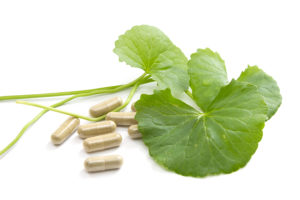
In Bali, Gotu Kola is called “the student herb” because it sharpens the mind. The Balinese also use it to combat senility.
It’s famous in southeast Asia as a longevity herb. The ancients were convinced that when elephants ate gotu kola, they lived longer than those that didn’t.
And we now know why these elephants lived longer. A study published in October 2019 showed that Gotu Kola extract provides an 8.8 fold increase in telomerase activity.
Other recent research shows shortened telomeres impairs DNA repair which shortens lifespan. And studies report reduced telomere length in patients suffering from mental disorders such as depression and anxiety.
The leaves of Gotu Kola have been used for thousands of years to boost cognition, improve cerebral circulation, and overall brain function.
As a nootropic, Gotu Kola has been shown to be particularly effective in elderly memory loss, slow thinking and reasoning. One study shows significant improvement in Alzheimer’s patients.[ii]
How does Gotu Kola Work in the Brain?
Gotu kola boosts brain health and function in several ways. But two in particular stand out.
- Neural dendrite and axon growth. Gotu kola helps increase the length and branches of neuron dendrites. And boosts axon growth.
Dendrites are tree-like branches extending out from neurons in the brain. They receive incoming signals from other neurons. Those signals are transmitted from axons extending out from neighboring neurons.
Dendrites and axons can change over time, and in response to environmental cues. Learning something new for example cause dendrites to lengthen.
But this natural signaling mechanism in your brain’s neurons degrade over time. And several studies have shown how Gotu kola can reverse this damage.
Scientists at the Oregon Health & Science University in Portland, Oregon did their research with Sprague-Dawley rats. They put Centella ethaniloc extract, a compound in Gotu kola, in the rat’s drinking water.
The study concluded that axons grew at a faster rate. And the researchers stated that gotu kola extract was useful for accelerating repair of damaged neurons.[iii]
Another study showed rats given gotu kola leaf extract had an increase of 105% in dendrite growth.[iv]
A very recent study published at Northwestern University and published in journal Nature showed how dendrites are critical in memory formation.[v]
- Increase in memory and learning. Gotu Kola has been revered for thousands of years for boosting memory. We know that Gotu kola extract can increase the availability of acetylcholine (ACh) in the brain. It does it by preventing ACh from breaking down.
This boost in memory may also benefit from Gotu kola’s ability to boost the growth of neuron dendrites and axons.
In one randomized, placebo-controlled, double-blind study done in Thailand, researchers gave 28 people Gotu kola extract for 2 months. Daily doses ranged from 250, 500 to 750 mg per day. Cognition in these subjects increased, and they experienced a boost in working memory.[vi]
How things go bad
Over the course of your life, your brain will lose 5 – 10% of its weight. It starts in your early 20’s.[vii]
The Framingham Offspring Cohort Study included 1,352 adults who did not have dementia. 7 years after the start of the study they used an MRI to measure participants brain size. And gave them tests to gauge executive function, planning, and organizational skills.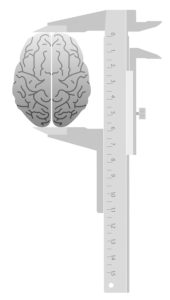
The researchers found that people with high blood pressure, diabetes, were overweight or smoked had faster brain shrinkage. They showed declines in ability to make decisions, plan, organize and remember details.[viii]
↓ Memory, cognition, learning and recall decline
↓ Neuronal cell death results in shrinking gray matter
↓ Neuroplasticity declines degrading long-term potentiation[ix]
Your brain will shrink regardless of lifestyle. But you can reduce the speed of this shrinkage by using Gotu kola.
Gotu Kola benefits
Research from hundreds of studies have shown that Gotu kola may:
- Improve memory and cognition
- Restore the availability of acetylcholine
- Improve cerebral blood flow
- Reduce anxiety and stress
- Help repair brain cells
- Eliminate free radicals from within brain cells
How does Gotu Kola feel?
Gotu kola improves acetylcholine levels in your brain. It increases blood flow and helps reduce oxidative damage and toxins in brain cells. As a result, you may feel a boost in mental activity.
Many say that taking Gotu Kola is like “energizing of the brain”. Particularly during a period of high mental demand. Mental blocks or mental fatigue feel like they’re swept away.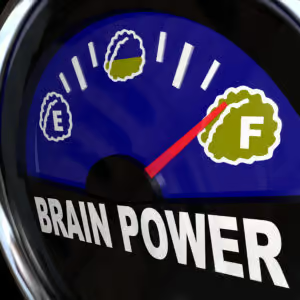
Others report dreams seem more vivid and intense. And Gotu kola provides an anxiolytic (anti-anxiety) effect as well.
Gotu Kola Clinical Studies
Ever been on your way to a party with the thought, “I hope I don’t kill too many brain cells”. Science once believed that the adult human brain could not grow new brain cells. We were born with all the brain cells we’ll ever have. Once those cells were gone, they’re gone for good.
Not too long ago a study was published in the Journal of Neuroscience. It detailed a discovery by scientists of the daily growth of new brain cells in the animals and humans. And because of this study, we now know your brain can grow new cells.
But the reality is, your brain will lose 5 – 10% of its weight. This shrinkage starts right around your 20th birthday.
The good news is you can prevent that shrinkage. And you can do it with Gotu kola.
Gotu Kola Improves Memory
Neurons connect to other neurons at a point called a synapse. Electrical pulses carry chemical messages across this gap. These chemical messengers are neurotransmitters. Each neuron in your brain can form thousands of these links.
Dendrites extend out from each neuron to neighboring neurons to receive these messages. Your brain uses these neurons in a type of network. And as one neuron sends signals to another, the synapse between the two gets stronger.
The more signals sent between these neurons, the stronger the connection grows. With each new experience, your brain slightly rewires this physical structure. This neuroplasticity determines how your brain is organized. And how memories are formed.
Gotu kola extends these neuron dendrites. And helps improve brain neuroplasticity. A study in animal models demonstrated neurite growth using a compound from gotu kola extract.[x] And clearly showed how Gotu Kola works to boost memory.
Gotu Kola Improves Mood and Cognition
Gotu kola has been revered for thousands of years for its ability to enhance cognition. So researchers in Thailand worked with 28 people in a placebo-controlled, double-blind trial to put some science behind this reputation.
Each participant in this study received an extract of Gotu kola at various doses ranging 250, 500, and 750 mg once per day for 2 months. The study showed the higher dose of Gotu kola enhanced working memory and mood.[xi]
Researchers in India set out evaluate the nootropic value of Gotu kola. Three-month old Swiss albino mice were given doses of Gotu kola extract for 15 and 30 days.
The researchers found that Gotu kola increases acetylcholine activity. And increased dendrites in the mice hippocampus. Showing that Gotu kola can promote higher brain function.[xii]
Gotu Kola Recommended Dosage
Recommended dose of Gotu kola standardized extract is 50 – 250 mg taken 2 or 3 times daily. Gotu Kola powder in capsules recommended dosage is 400 – 450 mg per day.
Standardized extracts should contain 40% asiaticoside, 29 to 30% asiatic acid, 29 to 30 % madecassic acid, and 1 to 2% madecassoside. But most Gotu Kola supplements sold in the USA are capsules of dried powder and not a standardized extract. The few extracts available contain only 10% Triterpenes.
In human studies in people with venous insufficiency (poor blood circulation in the legs), 90 – 180 mg daily worked well for these patients.
As a tincture (1:2 w/v, 30% alcohol): 30 to 60 drops (equivalent to 1.5 to 3 mL, there are 5 mL in a tsp.), 3 times daily.
Gotu Kola Side Effects
Side effects are rare with Gotu kola. But may include skin allergy and burning sensations if you’re applying it on your skin. Taken as a supplement, side effects could include headache, upset stomach, nausea, dizziness and drowsiness.
Gotu kola has been used in some studies that lasted up to one year. But please note that Gotu kola has the potential to be harmful to the liver. Some medical authorities caution that it is best not to use Gotu kola for more than 6 weeks without talking to your doctor.
Asiaticoside, a major part of Gotu kola, has also been linked with tumor growth in mice. If you have a history of precancerous or cancerous skin lesions, such as squamous cell, basal cell skin cancer, or melanoma, you should not use Gotu kola.
Some men have reported that Gotu Kola reduced libido. Animal studies show that supplementing with Gotu Kola may reduce sperm count in men, and reduce levels of testosterone, follicle-stimulating hormone (FSH), and luteinizing hormone (LH).
If you are dealing with kidney disease you should avoid using Gotu Kola
And if you have liver disease, or take medications that affect the liver, you should not take Gotu kola. Again, check with your doctor if you take any prescription medications, or often take over-the-counter pain relievers that could affect your liver.
Best Type of Gotu Kola to Buy
Gotu kola is available in teas, dried leaf in powder form, tinctures, capsule, tablets and ointments.
Most of the clinical studies used in this review were using Gotu Kola extracts. In the USA, most Gotu Kola supplements are not extracts but dried powder in capsules. And the few Gotu Kola extracts that are available contain at most 10% triterpenes.
You will get the most nootropic value from a standardized extract of Gotu Kola. Checking the user reviews will help narrow your choice.
Check to ensure the supplement company has a robust testing program in place. They should have a Certificate of Analysis available for the Gotu Kola supplement you are considering to verify the purity and quality of their supplement. If not, move on the next Gotu Kola supplement and run it through your verification process.
Nootropics Expert Recommendation
Gotu Kola extract up to 500 mg per day
 I recommend using Gotu Kola as a nootropic supplement.
I recommend using Gotu Kola as a nootropic supplement.
Your body does not make Gotu Kola. So you must take it as a supplement to get its effects.
This ancient herb has a long history of safe use as both an herbal remedy, and food throughout much of southeast Asia.
Here in the West, Gotu Kola is mostly used for healing varicose veins and skin conditions. But its overlooked as a nootropic.
Gotu Kola can improve your mood and memory. And protect your brain from free radicals and the toxins you’re exposed to everyday.
Gotu Kola as a nootropic has the potential to keep you mentally sharp for life. And if the ancients were right, may even help you live longer.
You can even out the stress and anxiety of your day by sipping Gotu Kola tea. Or use a supplement as a cognitive enhancer.
If you’re using Gotu Kola extract the recommend dosage is up to 500 mg per day which is 250 mg twice per day.

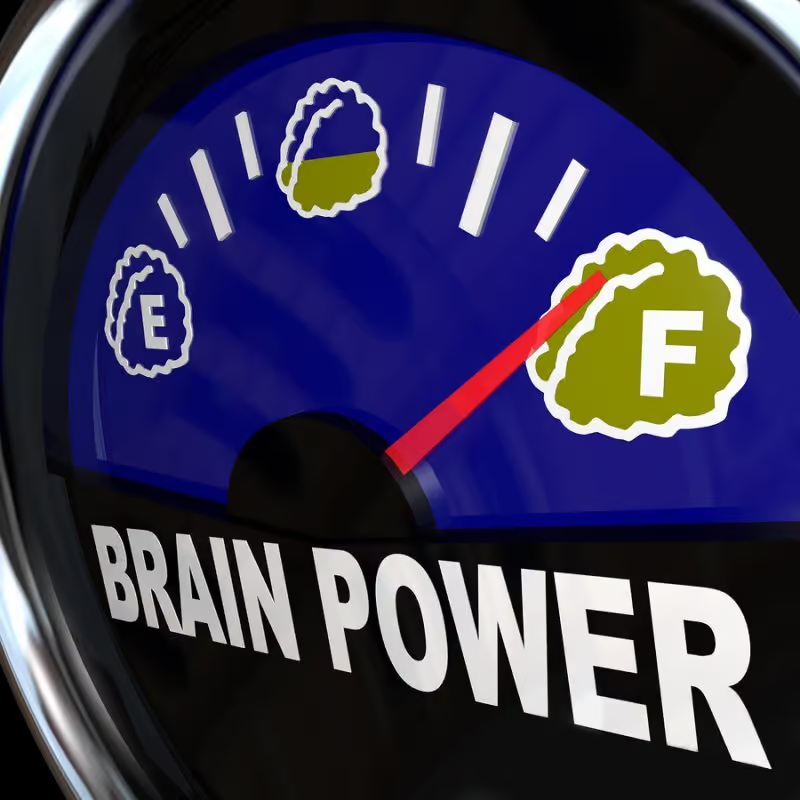

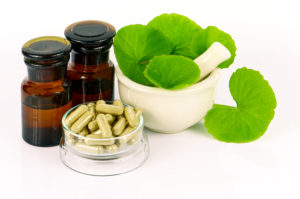





Join The Discussion - 67 comments
Rohan
May 7, 2025
Hey David, can I take Gotu Kola 500 mg along with Vortioxetine 15 mg (a serotonin modulator and stimulator)?
David Tomen
May 9, 2025
Rohan it should not be a problem.
Ross
August 1, 2024
Hi David
Have you seen this 2023 paper suggesting Asiatic acid as a natural ADHD (and other divergencies) treatment?
Gotu Kola would be the only affordable and ingestible source I can see, but as you point out, most brands have lower Asiatic acid content. The acid is extracted for skincare products, so if there is any mileage in this as a treatment, then it may be economical to develop a supplement.
“Identification of priority genes involved in ADHD using m ultiple system biology approach and estabishment of Asiatic acid as a natural inhibitor against GRIN2B receptor”
Kind regards
Ross
David Tomen
August 6, 2024
Ross, you can’t buy Asiatic acid at your local vitamin shop as far I know.
Ross
August 12, 2024
I guess my point was that quality gotu kola with highest % standardisation (10% seems the limit in vitamin shops at the moment) may be worth trying if looking to improve negative ADHD symptoms, and because it contains Asiatic acid. Genetic studies seem to be identifying promising leads for understanding, diagnosis and treatment, and although nothing conclusive, note worthy. There are enough user reports, perhaps studies, of GK to know it isn’t a universal solution like the paper suggests Asiatic acid might be. Similarly there are enough positive use cases to suggest it may be good for some people offering similar efficacy to bacopa plus other circulatory benefits. I may give it a go, although bacopa and pine bark are already in the product I am taking and the combination may be OTT.
David Tomen
August 13, 2024
Ross, this statement “isn’t a universal solution like the paper suggests” – there is no one pill solution. Anyone who claims there is is either lying or misinformed.
That said, Gotu Kola is often called “the student herb” in Bali. And they have been using this vine in that country for a very long time. But they don’t use an extract in capsules. They use leaves from the vine itself with great success.
There is no such thing as a “universal solution”. Even Mind Lab Pro which works for a LOT of people is not for everyone.
Poppy
May 16, 2024
Dear, David, though Gotu kola worked well for my anxiety and depression, unfortunately , I had to discontinue taking it due to my sensitive liver.
What would be a good alternative to Gotu kola?
David Tomen
May 19, 2024
Poppy, it is not a direct replacement but Ashwagandha shares similar mechanisms of action.
Poppy
April 29, 2024
Hello David. I never heard of Gotu Kola until I recently came across it watching one of your YouTube videos. I struggle with severe anxiety and many nootropics were unsuccessful. I started Gotu Kola a few days ago and I feel it is helping a little. I hope that over time, I will feel the full effects.
Thank you for all the information that you put out there. It is much appreciated.
Will
April 6, 2023
Hi David, I was wondering how long does one need to take Gotu Kola to see the effects? Are the effects/benefits immediate?
David Tomen
April 9, 2023
Will, with herbs it depends. Some find they work right away and others say they need to use the supplement daily for 2 – 3 weeks before they get the full benefit.
I suggest following the dosage recommendations on the bottle and use the whole bottle. If you do not feel any benefit by then you know it is the wrong supplement for you.